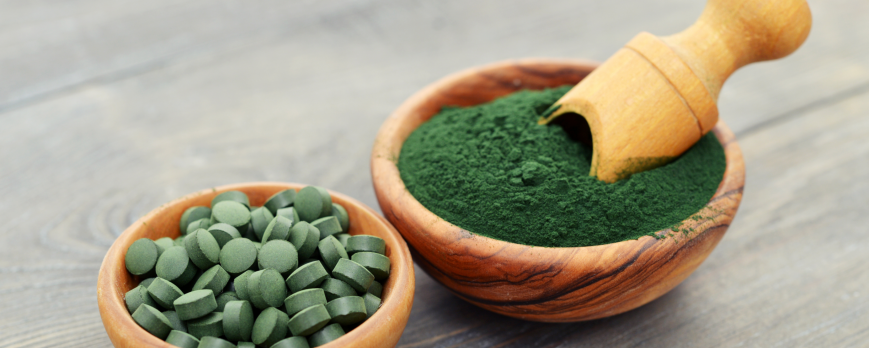
The 13 benefits of spirulina
We're currently professionally translating all content. In the meantime, this article has been translated by Google Translate. Sorry if this isn't 100% relevant.
WHO proclaimed spirulina as "the best food for humanity in the 21st century". The United Nations, WHO and UNICEF recalled in 1994, 1997 and 2003 that spirulina is the food of the 21st century ...
Why does this micro alga attract so much attention? Discover the 11 benefits of spirulina!
# 1 An important source of minerals
The particularly interesting minerals present in the composition of spirulina are iron, magnesium, calcium and phosphorus. Spirulina is a very important source of iron, from 3 mg to 8 mg per 5 g (20 times higher than wheat germ). In addition, the iron it contains has the advantage of being highly available.
Iron is a mineral found mainly in foods of animal origin such as meat, offal and fish. This contribution is among other things of great interest for vegetarians, pregnant women, athletes and teenagers in the growth phase.
As the mineral content of the soils is increasingly low, it follows that our food, which comes directly or indirectly from the soil, has also become very poor in essential minerals, which exposes us to more deficiencies.
Spirulina thus significantly reduces the risk of deficiency and deficiency of essential micronutrients.
# 2 A varied source of vitamins
The ß-carotene content is exceptional .. it is 30 times higher than that of the carrot and has the advantage of a very high bioavailability.
The vitamin B12 (cobalamin) content is also very important. It is important to note that this vitamin is by far the most difficult to obtain in a diet without meat, because no current vegetable contains it ... Spirulina is 4 times richer than the raw liver, long given as its best source.
A dose of 4g per day of dried spirulina is more than enough to cover all vitamin B12 requirements.
Spirulina also contains vitamin E.
The main antioxidant vitamins in spirulina are ß-carotene, vitamin E and other carotenoids. They protect our cells from the aggression of free radicals (anti-aging effect).
# 3 An extraordinary source of protein
Spirulina is a very rich source of vegetable protein, the most concentrated of all natural nutrients (animal or plant) with a record protein rate of up to 70%.
From a qualitative point of view, Spirulina proteins are complete because they contain all the essential amino acids (47% of the total protein weight).
# 4 An ecological alternative
The production of Spirulina is all the more interesting because it breaks all the records in terms of yields ... indeed, the yield of spirulina is 125 times greater than that of corn, 100 times more than beef. or 250 times more than rice.
# 5 An excellent ally against anemia
This incredible wealth of vitamins and minerals make it an excellent remedy in the prevention and treatment of anemia.
# 6 An anti-fatigue ally
Its richness in iron and vitamin B12 is also a good ally against fatigue strokes.
# 7 An ally against cholesterol
Studies have shown that Spirulina has a positive influence on the reduction of lipids in the blood as well as on the level of bad cholesterol in the blood (2). It seems to be a valuable asset against hypercholesterolemia.
A recent study found that people who consumed 4 g of spirulina for 6 weeks had low levels of "bad" cholesterol (LDL), "good" cholesterol (HDL), and lower triglycerides.
However, if the spirulina intake is interrupted or is not regular, the cholesterol levels return to their initial values.
This phenomenon of improvement of cholesterol level is due to the stimulation of an enzyme by spirulina, lipoprotein lipase, key enzyme in the metabolism of triglycerides and lipoproteins.
Spirulina is a very good ally to improve cholesterol levels, by lowering the "bad", but especially by increasing the "good".
# 8 It reduces the risk of diabetes
Consumption of Spirulina would also have a positive impact on fasting blood glucose levels and insulin efficiency. Two interesting factors in the treatment of diabetes!
# 9 It improves kidney function
Studies have shown that spirulina has a protective effect on the kidneys and this, thanks to the presence of a compound, phycocyanin.
# 10 Antioxidant Priorities
Studies have shown that spirulina has antioxidant properties, particularly because of its high beta-carotene, vitamin E and phycocyanin content. Phycocyanin is the only natural blue pigment that can be used as a food coloring
Laissez un commentaireRépondre
Recherche sur le blog
Blog categories
